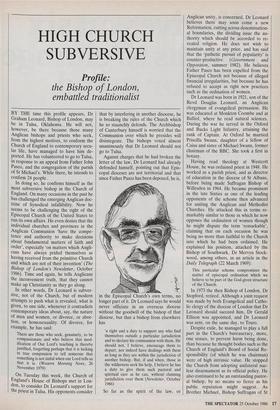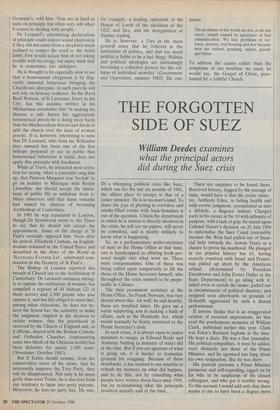HIGH CHURCH SUBVERSIVE
Profile: the Bishop of London, embattled traditionalist
BY THE time this profile appears, Dr Graham Leonard, Bishop of London, may be in Tulsa, Oklahoma. He will not, however, be there because those many Anglican bishops and priests who seek, from the highest motives, to conform the Church of England to contemporary secu- lar life, have managed to have him de- ported. He has volunteered to go to Tulsa, in response to an appeal from Father John Pasco, and the congregation of the parish of St Michael's. While there, he intends to confirm 24 people.
In doing so, he confirms himself as the most subversive bishop in the Church of England. On many occasions in the past he has challenged the emerging Anglican doc- trine of Synodical infallibility. Now he seems to be challenging the right of the Episcopal Church of the United States to run its own affairs. He even denies that the individual churches and provinces in the Anglican Communion 'have the compe- tence and authority to make decisions about fundamental matters of faith and order', especially 'on matters which Angli- cans have always prided themselves as having received from the primitive Church and which are not of their invention' (The Bishop of London's Newsletter, October 1986). Time and again, he tells Anglicans the inconvenient truth, that they cannot make up Christianity as they go along.
In other words, Dr Leonard is subver- sive, not of the Church, but of modern attempts to push what is revealed, what is given, to one side, whenever it contradicts contemporary ideas about, say, the nature of men and women, or divorce, or abor- tion, or homosexuality. Of divorce, for example, he has said: There are those who seek, genuinely, to be compassionate and who believe that mod- ification of Our Lord's teaching is thereby justified, forgetting perhaps that it is lacking in true compassion to tell someone that something is not sinful when our Lord tells us that it is. (Western Morning News, 26 November 1979) On Tuesday this week, the Church of England's House of Bishops met in Lon- don, to consider Dr Leonard's support for the priest in Tulsa. His opponents consider that by interfering in another disocese, he is breaking the rules of the Church which he so staunchly defends. The Archbishop of Canterbury himself is worried that the Communion over which he presides will disintegrate. The bishops voted almost unanimously that Dr Leonard should not go to Tulsa.
Against charges that he had broken the letter of the law, Dr Leonard had already defended himself, pointing out that Epis- copal dioceses are not territorial and that since Father Pasco has been deposed, he is, in the Episcopal Church's own terms, no longer part of it. Dr Leonard says he would never officiate in an overseas diocese without the goodwill of the bishop of that diocese, but that a bishop from elsewhere has 'a right and a duty to support any who find themselves outside a particular jurisdiction and to declare his communion with them. He should not, I believe, encourage them to depart, nor indeed have dealings with them as long as they are within the jurisdiction of another bishop. But, if and when, those in the wilderness seek his help, I believe he has a duty to give them such pastoral and spiritual care as he can, without claiming jurisdiction over them (Newsletter, October 1986) So far as the spirit of the law, or Anglican unity, is concerned, Dr Leonard believes there may soon come a new Reformation, cutting across denomination- al boundaries, the dividing issue the au- thority which should be accorded to re- vealed religion. He does not wish to maintain unity at any price, and has said that the 'pathetic pursuit of popularity' is counter-productive (Government and Opposition, summer 1982). He believes Father Pasco has been expelled from the Episcopal Church not because of alleged financial irregularities, but because he has refused to accept as right new practices such as the ordination of women.
Dr Leonard was born in 1921, son of the Revd Douglas Leonard, an Anglican clergyman of evangelical persuasion. He was educated at Monkton Coombe and at Balliol, where he read natural sciences. During the war he served in the Oxford and Bucks Light Infantry, attaining the rank of Captain. At Oxford he married Priscilla Swann, daughter of a fellow of Caius and sister of Michael Swann, former chairman of the BBC. She took a first in botany.
Having read theology at Westcott House, he was ordained priest in 1948. He worked as a parish priest, and as director of education in the diocese of St Albans, before being made Suffragan Bishop of Willesden in 1964. He became prominent in the late Sixties as one of the leading opponents of the scheme then advanced for uniting the Anglican and Methodist Churches. He attacked this in terms re- markably similar to those in which he now opposes the ordination of women though he might dispute the term 'remarkable', claiming that on each occasion he was being no more than faithful to the Church into which he had been ordained. He explained his position, attacked by the Bishop of Southwark, Dr Mervyn Stock- wood, among others, in an article in the Daily Telegraph (22 March 1969):
This particular scheme compromises the matter of episcopal ordination which we believe to be part of the God-given structure of the Church.
In 1973 the then Bishop of London, Dr Stopford, retired. Although a joint request was made by both Evangelical and Catho- lic clergy of the diocese of London that Dr Leonard should succeed him, Dr Gerald Ellison was appointed, and Dr Leonard was sent, on the same day, to Truro.
Despite exile, he managed to play a full part in the Church's bureaucracy, more, one senses, to prevent harm being done, than because he thought bodies such as the Church of England's Board of Social Re- sponsibility (of which he was chairman) were of high intrinsic value. He stopped the Church from adopting unilateral nuc- lear disarmament as its official policy. He also continued to be an outstanding pastor- al bishop, by no means so fierce as his public reputation might suggest. As Brother Michael, Bishop Suffragan of St Germans's, told him: `You are as hard as nails on principle but often very soft when it comes to dealing with people.'
Dr Leonard's unremitting declarations of principle could indeed sound pharisaical if they did not come from a shepherd much inclined to temper the wind to the shorn lamb. Few would accuse him of not taking trouble with his clergy, but many think that he is sometimes too indulgent He is thought to be especially slow to see that a homosexual clergyman is by flag- rantly immoral behaviour bringing the Church into disrepute. In such cases he will not rely on hearsay evidence. So the Revd Basil Watson, of St Lawrence Jewry in the City, has this autumn written in his Michaelmas newsletter that `in making his diocese a safe haven for aggressively homosexual priests he is doing more harm than his Machiavellian threats and deeds to split the church over the issue of women priests'. It is, however, interesting to note that Dr Leonard, who from his Willesden days onward has been one of the few bishops prepared to say in public that homosexual behaviour is sinful, does not apply this principle with harshness.
While at Truro, he attracted most atten- tion for saying, when a journalist rang him up, that Princess Margaret was 'foolish' to go on holiday to Mustique with Roddy Llewellyn: she should accept the limita- tions of public life or withdraw from it. Many observers said that these remarks had ruined his chances of becoming Archbishop of Canterbury.
In 1981 he was translated to London, though Dr Stockwood wrote to the Times to say that he should not accept the appointment. Some of the clergy at St Paul's certainly opposed him. Soon after his arrival, Elizabeth Canham, an English- woman ordained in the United States and described in the News of the World as 'BATTLING FATHER Liz', celebrated Com- munion in the Deanery of St Paul's.
The Bishop of London reported this breach of Church law to the Archbishop of Canterbury. Dr Leonard continues strong- ly to oppose the ordination of women, has compiled a register of 44 bishops (22 of them active) and 2,500 priests who also oppose it, and has felt obliged to warn that, among other objections, he does not be- lieve the Synod has 'the authority to make the judgment, implicit in the decision to ordain women, that the priesthood as received by the Church of England and, as it affirms, shared with the Roman Catholic and Orthodox Churches (representing some two-thirds of the Christian world) has been defective for nearly 2,000 years' (Newsletter, October 1985).
But if Tories should assume, from the conservative tenor of his views, that he necessarily supports the Tory Party, they will be disappointed. Not only is he more godly than most Tories, he is also free from any tendency to lapse into petty polemic. Moreover, he toes no party line. He was, for example, a leading opponent in the House of Lords of the abolition of the GLC and Ilea, and the deregulation of Sunday trading.
He is, however, a Tory in the more general sense that he believes in the limitations of politics, and that too much politics is liable to be a bad thing: 'Politics and political ideologies are increasingly becoming a collective pretext for the col- lapse of individual morality' (Government and Opposition, summer 1982). He con- tinues: The problems of the world are not, in the last resort, simply caused by ignorance or bad administration. We face problems of vio- lence, poverty, bad housing and war because men are violent, grasping, unjust, greedy and bitter.
To address the causes rather than the symptoms of our troubles, we need, he would say, the Gospel of Christ, proc- laimed by a faithful Church.



























































 Previous page
Previous page